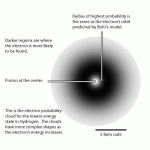S104 is really picking up the pace now - I've just submitted iCMA 48, with 93%. So that's good then. And I'm zig-zagging through TMA07, which is due in on September 1.
Actually, it's going quite well. I still have trouble deciphering some of the question wording, and suspect that they are set by people for whom English is not their first language, but you can't have everything.
Sometimes, things just snap into place. You need to worry about them for a day or so, fret that actually, you're rather stupid and you'll never get this, and then it happens. A golden moment, a small firework in your mind, and there it is: enlightenment and understanding.
Question 2 (c)(i), I have the measure of you. I challenge you to a duel; pick your pistol. I'm confident, knowledgeable, and I shall have my satisfaction, sir.
I've very much enjoyed Book 7 - Quarks to Quasars. I've struggled a little with the specifics, such as energy levels, and the subtle effects electrons have on one another, not to mention the strength of the various interactions. But the concepts, the wider questions that border on the philosophical as well as the scientific - those, I love.
The feeling of stretching your mind so wide open that you feel it's entirely possible there may be a permanent split is a heady rush. Have you ever stood on the edge of a cliff, or a very tall building, and had that momentary - just a split second - urge to throw yourself into the void? It's a little like that.
The Universe started as a very dense, very hot mass of energy, then exploded and expanded. But how? Where did the energy come from? Was it always there, or did it just pop into existence? Lawrence Krauss maintains that yes, it came from nothing. I'm afraid I can't accept that - which is why I shall keep reading, and watching, and learning.
And what about the "edges" of the Universe? What is it expanding into? Well, nothing that we can comprehend. The Universe has no edges, so to speak. It is everything. Or, it is everything in our comprehension. But that is not to say that there isn't some"thing" out there beyond that, far beyond our comprehension, made of stuff that we could never know...
The more I learn about our Universe, the more fascinating I find it. I worried that I would lose the meaning of life if I was truly convinced of how insignificant we are - but, if anything, I have experienced the opposite.
Perhaps everyone has (or wants, or needs) to believe in something. I'm not sure. I don't believe in a god, I know that now. This worried me for a time, as I see some of those I care for deeply, and their faith gives them strength and purpose. What would I have? I think my drive comes from a deep-seated desire to understand our Universe, to find out as much about it as I can. I believe it is within our grasp as a species, if we can manage not to destroy ourselves first. And what we find out may turn out to be completely unexpected.
And, I have faith in people. They are extraordinary.


